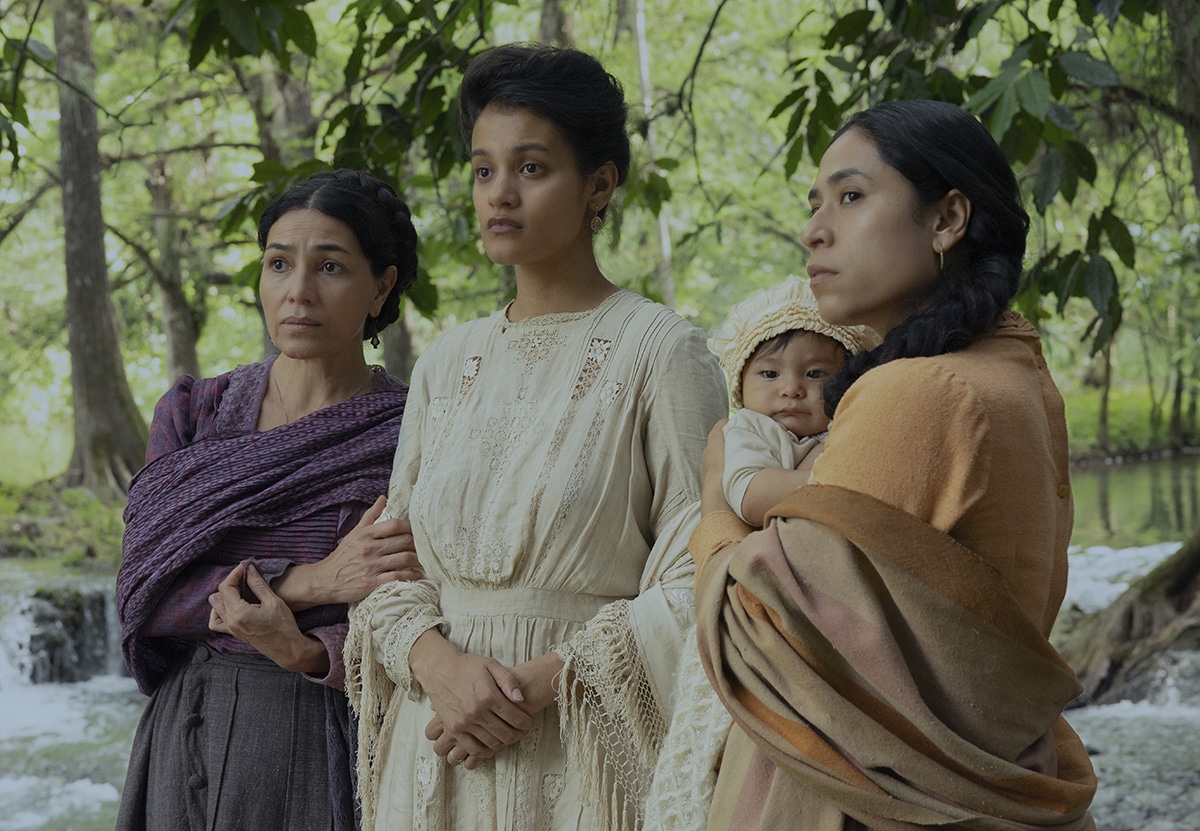Out today on Netflix, Pedro Páramo is Rodrigo Prieto’s adaptation of the iconic Mexican novel of the same name that set the blueprint for magical realism. It’s the story of Juan Preciado (Tenoch Huerta), a man who travels to the ghost town of Comala to find his absent father, Pedro Páramo (Manuel García-Rulfo).
Juan encounters a host of Mexican womanhood archetypes on his journey: the mother, the bruja, the girl next door, the loyal caretaker, and the crazy woman. The story transcends its premise of one man’s search for his father or even his more inner search. Instead, it’s more a tale of Mexico writ large, which makes it both frustrating and fascinating that the women within the story both complicate and are boxed in by Mexican standards of femininity.
One of the first women we meet is the mysterious Eduviges Dyada (Dolores Heredia), who greets Juan at the start of his journey, illuminating the past of Comala and her own experiences in the town. Eduviges was Juan’s mother’s best friend, and the pair had made a pact to die together to help each other in the afterlife. She was even, in her own words, “a hair away” from being Juan’s mother, thanks to her taking the place of Juan’s mother on her wedding night. Indeed, Eduviges serves as a kind of assistant to Juan’s mother throughout the film, so much so that the film offers no clear perception of her as a character outside of her relationship to Juan and Pedro.
We eventually learn that Eduviges is a ghost, like many of the entities Juan encounters in Comala. In her case, however, she took her own life, her end was a melancholy one. Through the very Catholic lens the film takes, she’s doomed to wander Comala as a kind of purgatory for committing suicide. In a film full of various women with different needs and wants, it’s understandable that we can’t spend more time with Eduviges, but I wish we could have gotten a deeper glimpse. In Pedro Páramo, a woman like Eduviges has to be content with eternal restlessness, doing little else besides leading men to fulfill their quests.
Perhaps the most important woman of Pedro Páramo is Susana San Juan (Ilse Salas). Susana is the love of Pedro’s life with the pair growing up together as children. The love that Pedro has for Susana is intense and destructive, driving Pedro to follow through on many of his worst impulses and actions. Susana, who left Comala as a child and then returned after her husband’s passing, is a prisoner of this love, stuck as the idealized vision of her that Pedro has built up in his mind. She rarely speaks, traumatized by the loss of her first husband, and refuses to accept Pedro’s advances.
Susana might be one of the most powerful characters in the film simply because she refuses to comply with Pedro’s idealized version of her. She starts as the literal girl next door, a perfect romantic interest, and then becomes the mad woman, untethered to any reality. To the film’s credit, she refuses to align herself with the expectations of wifehood when she marries Pedro. She is too lost in her memories, too rooted in herself to give him any mind. We see her deepest fantasies depicted in black and white, flowing with water and passion. Susana may not have been able to find freedom in her actual circumstances, but in her mind, she is free.
Pedro Páramo also features the Madonna and Loyal Laborer archetypes in Damiana Cisneros (Mayra Batalla). She’s the second person to appear to Juan at the beginning of his journey, explaining to him how she raised him from infancy until Juan and his mother were dismissed from Pedro’s household. The film paints her as the unwavering laborer, who often overlooks Pedro’s actions and continues in her position. Developing her beyond these archetypes would have been an interesting avenue for the story to take, but she gets no depth or growth, just a static representative of the unrealistic ideals of matriarchal care and work.
Pedro Páramo is both complex and surprisingly narrow in its depiction of women. The women of the film might be meant to stand alone as signifiers in Pedro Páramo’s greater narrative as an allegory for self-discovery or a nation’s values. But in the film, their significance is just as muddled as the line between life and death Juan Preciado encounters in Comala.

